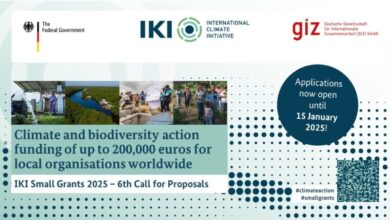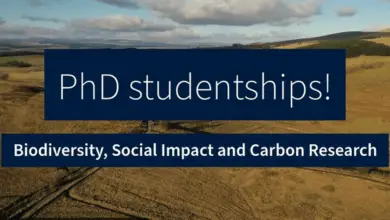Applications are now open for the GDPC Small Research Grants Program on Urban Climate Resilience (up to $10,000 USD for research)

Closing Date: 12 November 2024
Applications are now open for the GDPC Small Research Grants Program on Urban Climate Resilience (up to $10,000 USD for research)
The Global Disaster Preparedness Center (GDPC) is pleased to announce the launch of its small research grants program, focused on the theme climate resilience in urban areas. This initiative aims to deepen the understanding of urban climate resilience by supporting original research in low- and middle-income countries. The program is designed to expand the evidence base and contribute to building more resilient urban environments in the face of climate change.
Program Overview
The GDPC small research grants program provides funding to university researchers for projects focused on climate resilience in urban areas within selected topics. This program specifically supports scholars who traditionally have limited access to funding, with grants available exclusively to researchers from low and middle-income countries.
Awards provide up to $10,000 USD for research lasting up to eight months, with a completion deadline of September 30, 2025. This program supports applied and impactful research that can inform policy, planning, humanitarian programming, community action, and so on. Research must be original, and plagiarism will result in immediate disqualification at any stage of the grant process.
Background
68% Of the world population projected to live in urban areas by 2050. Cities are home to over half of the global population, with 4.4 billion people living in urban areas. By 2050, urban areas are expected to accommodate an additional 2.5 billion people, with nearly 90% of this growth concentrated in Asia and Africa. While urban centers are significant contributors to climate change due to rapid growth and high emissions, they are also increasingly vulnerable to climate-related hazards, leading to rising human and economic losses.
The greatest increase in urban vulnerability is occurring in low and middle-income nations, particularly in unplanned and informal settlements. These areas often have limited capacity to adapt to climate risks, and many small to medium-sized urban centers lack the necessary resources to respond effectively. Despite these challenges, cities are not just on the frontlines of climate impacts, but they are also hubs for innovation and solutions.
This research program aims to deepen the understanding of urban climate resilience, focusing on low- and middle-income countries. By supporting original research, the program seeks to expand knowledge and evidence on diverse pathways to climate resilience across multiple levels—ranging from governance and socio-economic drivers to community-led innovations and nature-based solutions in cities of different sizes.
Research Topics
The program seeks to stimulate new knowledge in priority research questions under the following topics:
Topic 1
Community-Led Climate Adaptation and Resilience Solutions in Cities
- Topic 1.1: Community-driven innovations for adaptation. What are the success factors for community-led innovative strategies and solutions for climate adaptation in urban areas, including technology-enabled solutions.
- Topic 1.2: Participatory urban planning. How do participatory approaches in urban planning contribute to climate resilience, and what evidence demonstrates their effectiveness and best practices.
Topic 2
Socio-Economic and Institutional Drivers of Climate Resilience in Cities
- Topic 2.1: Socio-economic pathways to resilience. Effectiveness and success factors for different types of socio-economic incentives and ‘boosts’ to climate resilience of individuals, households, and small businesses, particularly in the informal sector in cities. Examples of such ‘boosts’ include one-time cash grants, micro-insurance, rotating credits or loans, tax incentives, matched funds, support for cooperatives, and support from social safety nets, etc.
- Topic 2.2: Urban climate governance. What is the role of cities in climate governance, and what are the strategies and institutional frameworks that support and/or hinder effective and equitable climate action in different urban contexts
Topic 3
Urban Ecosystems for Resilience
- Topic 3.1: Climate-Resilient Urban Ecosystem. What constitutes a climate-resilient urban ecosystem, its key features and components, how it functions, and how it can be cultivated or restored in different urban contexts.
- Topic 3.2: Community-based approaches to Nature-Based Climate Solutions. Assessing effectiveness and strategies for implementing and scaling impactful nature-based solutions at the local level in urban areas.
Eligibility
Applicants must be affiliated with an accredited university at the time of submission, including graduate (Master’s and PhD) students, post-doctoral researchers, and faculty members. Teams of researchers are welcome to submit proposals, and collaboration among different institutions is highly encouraged. Identification of an experienced supervisor is required for any student research teams. The supervisor should provide guidance and oversight throughout the research process.
Applications are open to researchers who are nationals of low- and middle-income countries, including least developed and upper-middle-income nations. Research must be focused on these countries. A list of eligible countries can be found here.
Proposed research projects must align with one of the the program’s defined topics and clearly demonstrate how they contribute to the selected area of focus. Projects must be feasible for completion within the eight-month program timeline, running from February to September 30, 2025.
Researchers may conduct their research in any language, but the final research paper must be submitted in English. If translation into English is needed, the budget proposal should include estimated costs for translation services.
Selection Criteria
Eligible proposals will be reviewed by an expert panel consisting of representatives from GDPC, IFRC, and other humanitarian organizations. Proposals will be evaluated based on the following criteria:
- Scientific merit and rigor, clearly demonstrating how the proposed research advances current knowledge and fills critical gaps.
- Relevance and the alignment of the proposed research with one of the defined research topics, demonstrating a clear understanding of the research question and how the project contributes to the program’s overall objectives.
- Potential impact and applicability of research in informing policy and practice to more effectively take action in strengthening climate resilience.
- A thorough understanding of potential ethical concerns and implications associated with the research, along with strategies to mitigate and address these issues.
- Qualifications and expertise of the Principal Investigator and key co-investigators (if applicable) to carry out the proposed research. This includes an assessment of the research team’s capability and relevant experience in implementing the proposed project projects, supported by evidence of relevant skills and a proven track record in delivering similar projects.
- Reasonable and realistic budget proposal, including a detailed expense breakdown. For details on eligible and ineligible costs, refer to the FAQ section .
- A clear and achievable timeline demonstrating the ability to complete and submit the final research paper by September 30, 2025, or earlier.
Click Here To Apply
Follow Opportunities For Everyone on Social Media




